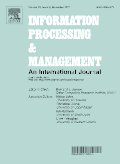Editorial Board
Introduction
Symposium opening addresses
Empirical laws and theories of information and software sciences
Program evolution
Ranking techniques and the empirical log law
Sign detection theory and its applications
Abstraction in methodology: A framework for computer support
Psychological perspectives for software science
Problem solving techniques for the design of algorithms
Chunks: A basis for complexity measurement
Human information seeking and design of information systems
Back-to-front programming effort prediction
Data representation and lexical calculi
Some varieties of information
Software metrics: An overview of an evolving methodology
The measurement of information
A preliminary investigation of the use of the cloze procedure as a measure of program understanding
Simple metrics for programming languages
Experimental design methodologies in software science
Experimental and quasi-experimental designs for research in information science
The relation between theory and methodology for designing experiments in information science
Software models for real-world applicability tests: Extended abstract
Some new observations about software science indicators for estimating software quality
Hierarchical progression analysis: A development and verification methodology
Mathematical models of text
Data collection and evaluation for experimental computer science research
Empirical investigation of COBOL features
An analytic resource model for large-scale software development
Metrics for the comparison of parallel algorithms and their design methodologies
Research directions in empirical foundations of information and software science


